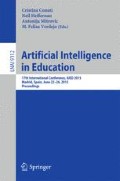Abstract
Tutorial dialogue systems often simulate tactics used by experienced human tutors such as restating students’ dialogue input. We investigated whether the amount of tutor restatement that supports student inference interacts with students’ incoming knowledge level in predicting how much students learn from a system. We found that students with lower incoming knowledge benefit more from an increased level of these types of restatement while students with higher incoming knowledge benefit more from a decreased level of such restatements.
Access this chapter
Tax calculation will be finalised at checkout
Purchases are for personal use only
Preview
Unable to display preview. Download preview PDF.
References
Albacete, P., Jordan, P., Katz, S.: Is a dialogue-based tutoring system that emulates helpful co-constructed relations during human tutoring effective? In: 17th International Conference on Artificial Intelligence in Education AIED (2015)
Becker, L., Ward, W., Vuuren, S.V., Palmer, M.: Discuss: a dialogue move taxonomy layered over semantic representations. In: The 9th International Conference on Computational Semantics IWCS 2011 Oxford, England, January 2011
Chi, M.T.H., Roy, M.: How adaptive is an expert human tutor? In: Aleven, V., Kay, J., Mostow, J. (eds.) ITS 2010, Part I. LNCS, vol. 6094, pp. 401–412. Springer, Heidelberg (2010)
Dzikovska, M., Campbell, G., Callaway, C., Steinhauser, N., Farrow, E., Moore, J., Butler, L., Matheson, C.: Diagnosing natural language answers to support adaptive tutoring. In: International FLAIRS Conference (2008)
Freedman, R.: Using a reactive planner as the basis for a dialogue agent. In: International FLAIRS Conference (2000)
Hyland, K.: Applying a gloss: Exemplifying and reformulating in academic discourse. Applied Linguistics 28(2), 266–285 (2007)
Kalyuga, S., Ayres, P.: The expertise reversal effect. Educational Psychology 38, 23–31 (2003)
McNamara, D., Kintsch, E., Songer, N., Kintsch, W.: Are good texts always better? text coherence, background knowledge, and levels of understanding in learning from text. Cognition and Instruction 14, 1–43 (1996)
Person, N., Graesser, A., Kreuz, R., Pomeroy, V.: Simulating human tutor dialog moves in autotutor. International Journal of Artificial Intelligence in Education 12, 23–39 (2003)
Author information
Authors and Affiliations
Corresponding author
Editor information
Editors and Affiliations
Rights and permissions
Copyright information
© 2015 Springer International Publishing Switzerland
About this paper
Cite this paper
Jordan, P., Albacete, P., Katz, S. (2015). When Is It Helpful to Restate Student Responses Within a Tutorial Dialogue System?. In: Conati, C., Heffernan, N., Mitrovic, A., Verdejo, M. (eds) Artificial Intelligence in Education. AIED 2015. Lecture Notes in Computer Science(), vol 9112. Springer, Cham. https://doi.org/10.1007/978-3-319-19773-9_85
Download citation
DOI: https://doi.org/10.1007/978-3-319-19773-9_85
Published:
Publisher Name: Springer, Cham
Print ISBN: 978-3-319-19772-2
Online ISBN: 978-3-319-19773-9
eBook Packages: Computer ScienceComputer Science (R0)

